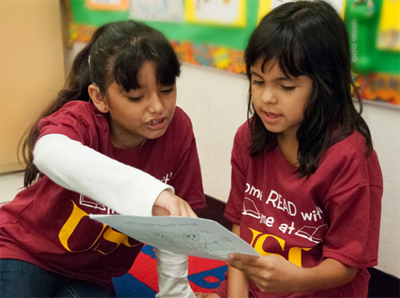Despite advances in technology like the cochlear implant, children with hearing loss continue to demonstrate significant challenges learning to read and write. They struggle to keep pace with their peers, and, according to the American Speech-Language-Hearing Association, those with severe hearing loss may not learn past the third- or fourth-grade level. Early support can help close that gap.
Offered by the USC Caruso Family Center for Childhood Communication, Come Read With Me at USC has been boosting the language and literacy skills of boys and girls who are deaf and hard of hearing since 2013. Held three weeks each summer, the program supports children ages 5-9 years from low-income households where at least one parent speaks Spanish. About 20 children from throughout Greater Los Angeles enroll in the program annually.

“Children with hearing loss have a lot of difficulty becoming literate, because the loss of hearing affects your ability to acquire language,” says Debra K. Schrader, an educational specialist at the Caruso Family Center, part of the USC Caruso Department of Otolaryngology — Head and Neck Surgery. “And the child’s understanding of language that supports literacy.”
Schrader created the program with audiologist Karen C. Johnson, PhD; speech-language pathologist Dianne Hammes Ganguly, MA; and biostatistician Laurel M. Fisher, PhD. It grew out of conversations Schrader and Hammes Ganguly had with parents of children coming in for communication evaluations and educational counseling.
“We found that a lot of families didn’t understand how children learn to read and write, and how they can support their children in the home environment,” Schrader recalls.
She and Hammes Ganguly conferred with Johnson and Fisher about creating a literacy program tailored for children with hearing loss. “We didn’t want to duplicate summer programs already offered by public schools,” Schrader explains. “Our program sought to support the child, the parents and the teachers in the community.”
Children in the program show significant improvement in key areas such as conversational turn-taking during shared storybook reading, phonological awareness and concepts of print.
Their parents attend seminars led by a bilingual certified teacher of the deaf who is also a certified listening and spoken language specialist. In addition to gaining a sense of empowerment through helping their children, participating parents often report decreased stress about engaging their kids in reading and literacy activities.
“Parents are hungry for information and knowledge,” says Johnson, a USC associate professor of Clinical Otolaryngology. “Their enthusiasm is inspiring.”
Johnson also serves as principal investigator of the research aspects of the program, fostering its use as a model for other educators and care providers.
“Karen’s passion for making parents full partners in their children’s education is genuine,” Schrader says. “Her dedication and commitment to enhancing the quality of life for children with hearing loss by improving their language and literacy outcomes is evident daily.”
Meanwhile, educators, administrators, and speech and hearing therapists benefit from the program’s Summer Teacher Institute, where they receive 30 hours of instruction in applying evidence-based strategies to bolster early literacy skills and develop spoken language. These professionals — who support an estimated 750 children who are deaf and hard of hearing in Southern California — then take what they learn back to their own schools, practices and programs.
“We wanted to expand our community impact by providing other professionals with evidence-based strategies that they can use and also share with colleagues,” Schrader says.
One teacher even set up a crowdfunding site to raise money for a collection of Spanish books that parents could use in sharing the program’s techniques with their children. Schrader has also helped other teachers and administrators implement the Come Read With Me summer model at their own schools.
“Come Read With Me at USC is having a ripple effect,” notes Hammes Ganguly, an assistant professor of Clinical Otolaryngology – Head and Neck Surgery. “Children are more engaged in reading and writing activities. Parents are learning new ways to help their children become better readers and writers. And teachers are gaining additional skills in helping parents and children during this learning process.”
The program also enables parents to reach out to other families with children with hearing loss and supports teachers with knowledge they can apply to their own classrooms. Come Read with Me at USC can serve as a model for building quality interactions during a critical period of literacy development that is fundamental to future educational success. This benefits children, their families, schools and communities.
Given that the state of California alone has nearly 17,000 children and young adults who are deaf or hard of hearing — and more than half that number are Latino — Come Read with Me and the initiatives it triggers will be crucial to turning a vital page in educational development for generations to come.
To make a gift to the Caruso Department of Otolaryngology – Head and Neck Surgery, click here.